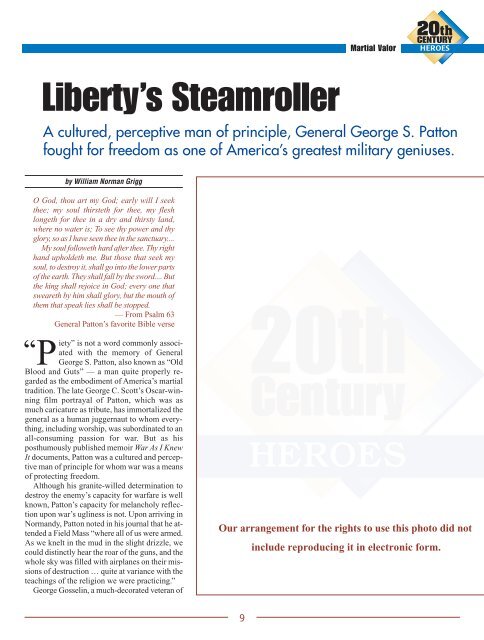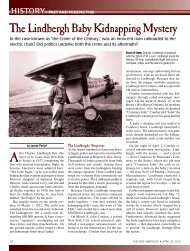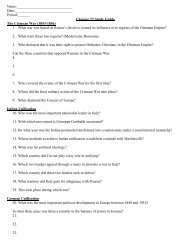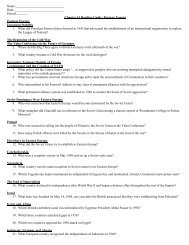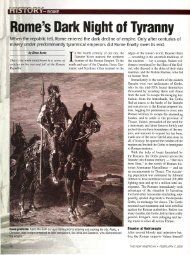Liberty's Steamroller - Home
Liberty's Steamroller - Home
Liberty's Steamroller - Home
You also want an ePaper? Increase the reach of your titles
YUMPU automatically turns print PDFs into web optimized ePapers that Google loves.
Liberty’s <strong>Steamroller</strong><br />
A cultured, perceptive man of principle, General George S. Patton<br />
fought for freedom as one of America’s greatest military geniuses.<br />
by William Norman Grigg<br />
O God, thou art my God; early will I seek<br />
thee; my soul thirsteth for thee, my flesh<br />
longeth for thee in a dry and thirsty land,<br />
where no water is; To see thy power and thy<br />
glory, so as I have seen thee in the sanctuary....<br />
My soul followeth hard after thee. Thy right<br />
hand upholdeth me. But those that seek my<br />
soul, to destroy it, shall go into the lower parts<br />
of the earth. They shall fall by the sword.... But<br />
the king shall rejoice in God; every one that<br />
sweareth by him shall glory, but the mouth of<br />
them that speak lies shall be stopped.<br />
— From Psalm 63<br />
General Patton’s favorite Bible verse<br />
is not a word commonly associated<br />
with the memory of General<br />
‘‘Piety”<br />
George S. Patton, also known as “Old<br />
Blood and Guts” — a man quite properly regarded<br />
as the embodiment of America’s martial<br />
tradition. The late George C. Scott’s Oscar-winning<br />
film portrayal of Patton, which was as<br />
much caricature as tribute, has immortalized the<br />
general as a human juggernaut to whom everything,<br />
including worship, was subordinated to an<br />
all-consuming passion for war. But as his<br />
posthumously published memoir War As I Knew<br />
It documents, Patton was a cultured and perceptive<br />
man of principle for whom war was a means<br />
of protecting freedom.<br />
Although his granite-willed determination to<br />
destroy the enemy’s capacity for warfare is well<br />
known, Patton’s capacity for melancholy reflection<br />
upon war’s ugliness is not. Upon arriving in<br />
Normandy, Patton noted in his journal that he attended<br />
a Field Mass “where all of us were armed.<br />
As we knelt in the mud in the slight drizzle, we<br />
could distinctly hear the roar of the guns, and the<br />
whole sky was filled with airplanes on their missions<br />
of destruction … quite at variance with the<br />
teachings of the religion we were practicing.”<br />
George Gosselin, a much-decorated veteran of<br />
9<br />
Martial Valor<br />
20th<br />
CENTURY<br />
HEROES<br />
Our arrangement for the rights to use this photo did not<br />
include reproducing it in electronic form.
20th<br />
CENTURY<br />
HEROES<br />
George Patton<br />
“I am a strong believer in prayer.<br />
There are three ways that men<br />
get what they want: by<br />
planning, by working, and by<br />
praying. Any great military<br />
operation takes careful<br />
planning.... But between the<br />
plan and the operation there is<br />
always the unknown.... Some<br />
people call that getting the<br />
breaks; I call it God.”<br />
— General Patton<br />
Patton’s army, observed that while the<br />
general was a “taskmaster” who demanded<br />
exemplary order and discipline<br />
within the ranks, he was also a man of<br />
profound and sincere faith. It should not<br />
be forgotten, wrote Gosselin, that “this<br />
man, who was so hard on himself and<br />
others, was totally soft on God.” “I am a<br />
strong believer in prayer,” declared General<br />
Patton on one occasion. “There are<br />
three ways that men get what they want:<br />
by planning, by working, and by praying.<br />
Any great military operation takes careful<br />
planning. Then you must have well<br />
trained troops to carry it out. But between<br />
the plan and the operation there is always<br />
the unknown. That unknown spells success<br />
or failure. Some people call that getting<br />
the breaks; I call it God. God has His<br />
part or margin in everything. That’s where<br />
prayer comes in.”<br />
As a believer, Patton’s God was Christ,<br />
not Mars. As a master strategist given to<br />
fits of tactical genius he couldn’t explain,<br />
Patton understood the need for focused<br />
ruthlessness in confronting an insurgent<br />
foe; as a Christian, he understood and<br />
practiced the virtue of mercy in dealing<br />
with a conquered enemy. These complementary<br />
aspects of Patton’s personality<br />
were on display during an interview with<br />
the Vicar of Sicily after Patton’s forces<br />
routed the Italian Army. “I assured him,”<br />
wrote Patton, “that I was amazed at the<br />
stupidity and gallantry of the Italian<br />
Army; stupid, because they were fighting<br />
for a lost cause, and gallant, because they<br />
were Italians.” Patton asked the Vicar to<br />
call upon the Italians to surrender in order<br />
to prevent needless bloodshed. “As a<br />
matter of fact,” wrote Patton, “I called off<br />
the air and naval bombardments we had<br />
arranged, because I felt enough people<br />
had been killed, and felt that with the<br />
drive of the 2nd Armored Division we<br />
could take the place without inflicting<br />
unproductive losses on the enemy.”<br />
On another occasion, Patton referred reproachfully<br />
to what he called “the seemingly<br />
barbaric bombardment of the centers<br />
of cities” during the war, a practice that did<br />
not comport with Patton’s sense of martial<br />
chivalry and the moral principles of just<br />
warfare. “Kill all the Germans you can,”<br />
urged the general during the Third Army’s<br />
unprecedented drive across Europe, “but<br />
do not put them up against a wall and kill<br />
them. Do your killing while they are still<br />
fighting. After a man has surrendered, he<br />
should be treated exactly in accordance<br />
with the Rules of Land Warfare, and just<br />
as you would hope to be treated if you<br />
were foolish enough to surrender. Americans<br />
do not kick people in the teeth after<br />
they are down.”<br />
George Smith Patton was born in<br />
California in 1885, and at the age<br />
of five he informed his parents of<br />
his intention of becoming a “great general.”<br />
“When he learned to read, the first<br />
book he bought was a history of decisive<br />
battles,” recounted Colonel Robert S.<br />
Allen in Lucky Forward, his memoir of<br />
serving in Patton’s Third Army. “In school<br />
he was always organizing sham battles.<br />
On his honeymoon in France, he took his<br />
young bride to historic battlefields and<br />
fortresses. Later, when stationed in<br />
Hawaii, he and his wife and young children<br />
would stage assault landings while on<br />
sailing trips. Even when playing his<br />
beloved polo, and fox hunting, he played<br />
at war.” Patton received his Cavalry commission<br />
in 1909. After representing the<br />
U.S. at the 1912 Olympic Games, Patton<br />
took part in General John J. Pershing’s<br />
punitive raid into Mexico in 1916. Pershing<br />
took Patton to France in 1917 as a<br />
10<br />
staff captain, and Patton finished World<br />
War I as a commander of a tank brigade.<br />
During a mere 13 months of combat<br />
command in World War II — a little more<br />
than a month in northern Africa, 38 days<br />
in Sicily, 318 days in northwest Europe<br />
— Patton gradually showed himself to be<br />
America’s greatest fighting general. Under<br />
his command, the Third Army killed<br />
or captured 1.4 million soldiers of the<br />
Third Reich, while enduring the lowest<br />
casualty rate of any Allied army in the<br />
European Theater of Operations (ETO).<br />
A strategic assessment of Allied generals<br />
compiled by the German Oberkommando<br />
Herres (high command) described<br />
Patton as “the most modern, and the only,<br />
master of the offensive” among Allied<br />
commanders: “Patton is the most dangerous<br />
general on all fronts. The tactics<br />
of other generals are known and countermeasures<br />
can be effected against them.<br />
Patton’s tactics are daring and unpredictable.<br />
He fights not only the troops opposing<br />
him, but the Reich.”<br />
This ironic tribute from Patton’s enemies<br />
is made more ironic still in light of<br />
the post-war smear campaign, mounted by<br />
Soviet sympathizers in the press and acted<br />
upon by a pro-Soviet political establishment,<br />
depicting the general as a covert<br />
Know the past: Through diligent study of<br />
military history, Patton was able to get inside<br />
the head of an enemy, even predicting in 1937<br />
a Japanese sneak attack against Pearl Harbor.
Nazi sympathizer. “It is not an exaggeration<br />
to state that Patton fought two wars in<br />
the ETO: one against the enemy and one<br />
against higher authorities for the opportunity<br />
to fight the enemy,” notes Colonel<br />
Allen. After Germany surrendered on May<br />
7, 1945, Patton realized that our Soviet<br />
“allies” — who had begun the war as coaggressors<br />
with National Socialist Germany<br />
— were in fact our enemy, and he<br />
urged his superiors to evict the Soviets<br />
from central and eastern Europe.<br />
In a conversation with then-Undersecretary<br />
of War Robert P. Patterson that<br />
took place in Austria shortly after the<br />
Nazi surrender, Patton complained that<br />
the “point system” being used to de-mobilize<br />
Third Army troops was destroying<br />
the Third Army, and creating a vacuum<br />
that the Soviets would exploit. “Mr. Secretary,<br />
for God’s sake, when you go<br />
home, stop this point system; stop breaking<br />
up these armies,” pleaded the general.<br />
“Let’s keep our boots polished, bayonets<br />
sharpened, and present a picture of<br />
force and strength to these people [the<br />
Soviets]. This is the only language they<br />
understand.” Asked by Patterson — who<br />
would become Secretary of War a few<br />
months later — what he would do, Patton<br />
replied: “I would have you tell the<br />
[Red Army] where their border is, and<br />
give them a limited time to get back<br />
across. Warn them that if they fail to do<br />
so, we will push them back across it.”<br />
Patton knew that the Red Army was<br />
weak, under-supplied, and vulnerable,<br />
and that if Europe were to be freed from<br />
totalitarian despotism, the West would<br />
have to act before the Soviets consolidated<br />
their position. “Oh George,” came<br />
the condescending reply from Patterson,<br />
“you … have lost sight of the big picture.”<br />
That “big picture,” as leftist historian<br />
Arthur Schlesinger Jr. explained in the<br />
July/August 1995 issue of Foreign Affairs,<br />
“was to commit the United States<br />
to postwar international structures before<br />
[victory] … could return the nation to its<br />
old habits.” In order to keep our nation<br />
entangled in the growing network of international<br />
bodies, a credible foreign<br />
menace was needed, and the Soviets were<br />
perfectly cast in the part. “It is to Joseph<br />
Stalin that Americans owe the 40-year<br />
suppression of the isolationist impulse,”<br />
wrote Schlesinger with approval.<br />
Had Patton been permitted to drive the<br />
Soviets from Europe, millions of people<br />
would have been spared decades of abject<br />
oppression, and the criminal elite that<br />
continues to dominate most of eastern and<br />
central Europe might never have come to<br />
power. Patton understood, and warned his<br />
superiors, that if the Soviets were allowed<br />
to consolidate their grip, “we have failed<br />
the liberation of Europe; we have lost the<br />
war!” Patton, an honorable and patriotic<br />
man, was apparently unable to accept the<br />
fact that while he and his soldiers fought<br />
to liberate their fellow men from tyranny,<br />
those above him in policy-making positions<br />
were seeking to control the world,<br />
not to emancipate it. Thus Patton was traduced<br />
in the servile press as a covert<br />
“Nazi sympathizer” and stripped of his<br />
command shortly before his fatal automobile<br />
accident on December 9, 1945.<br />
Patton “was a man who trained and<br />
disciplined his mind and body<br />
nearly every day of his life for the<br />
role he had always known he was to<br />
play,” recorded Patton’s nephew, Fred<br />
Ayer, Jr., in his book Before the Colors<br />
Fade: Portrait of a Soldier. “[He was] a<br />
11<br />
Martial Valor<br />
20th<br />
CENTURY<br />
HEROES<br />
Rommel (standing, front), like other German generals, knew Patton was the Allies’ only “master of<br />
the offensive.” Heading the 2nd U.S. Corps., Patton proved it, whipping the vaunted Afrika Corps.<br />
man who believed in the aristocracy of<br />
achievement and in the sanctity of his<br />
country’s course. He was conceited,<br />
sometimes ruthless, often inconsiderate<br />
and outwardly very, very tough. He was<br />
often too much the impetuous showman<br />
and yet a deep and careful thinker. But he<br />
was also magnificently well-read, deeply<br />
religious, softhearted, emotional and easily<br />
moved to tears.”<br />
It is quite likely that Patton possessed<br />
the finest military mind our nation ever<br />
produced, and that mind was the result of<br />
a deep and expansive study of history.<br />
“Papa always told me that the thing was<br />
to be a good soldier,” recalled the general.<br />
“Next was to be a good scholar.” It<br />
was Patton’s scholarly exertions that<br />
made his soldierly exploits possible. “To<br />
be a successful soldier you must know<br />
history,” Patton advised in War As I Knew<br />
It. “Read it objectively. Dates and even<br />
the minute details of tactics are useless.<br />
What you must know is how man reacts.<br />
Weapons change, but man who uses them<br />
changes not at all.... To win battles you<br />
do not beat weapons — you beat the soul<br />
of man, of the enemy man.” Because he<br />
was a diligent student of the past, noted<br />
Ayer, Patton “would accurately be able to<br />
foretell much of the future.”<br />
Not only was Patton an omnivorous<br />
NARA
20th<br />
CENTURY<br />
HEROES<br />
George Patton<br />
reader, he was blessed with uncanny powers<br />
of retention, and could quote extensively<br />
from nearly anything he read — the<br />
Bible, military history, Shakespeare, even<br />
the Koran (which he read as preparation<br />
for his arrival in northern Africa). While<br />
Patton was stationed in Hawaii as a<br />
colonel, he maintained a personal library<br />
containing hundreds of books — histories,<br />
biographies, memoirs, and political<br />
works — nearly all of which had been<br />
read and annotated with margin notes.<br />
His preternatural gifts of retention and<br />
recall proved indispensable during the<br />
Third Army’s mad dash across Europe.<br />
“He collected maps the way some men<br />
do art treasures,” recalls Colonel Allen.<br />
“He knew the entire road net of France<br />
and Germany by memory, and the details<br />
of every major battlefield.” Before his<br />
arrival in Normandy, Patton devoured<br />
Douglas Southall Freeman’s The Norman<br />
Conquest, paying particular attention to<br />
the roads used by William the Conqueror<br />
during his campaigns in Normandy and<br />
Brittany almost nine centuries earlier. Using<br />
those ancient roads, explained Patton,<br />
provided his army with valuable avenues<br />
of attack “when the enemy resorts, as he<br />
always does, to demolition.”<br />
Patton’s diligent study of military history<br />
could have spared our nation one of<br />
its most painful defeats, had Patton’s superiors<br />
been willing to listen to him. In<br />
1937, during his assignment in Hawaii,<br />
then-Colonel Patton composed a detailed<br />
report predicting, in unsettling detail, the<br />
sneak attack by Japan against Pearl Harbor<br />
four years later. Taking note of the<br />
fact that Japan’s 1904 sneak attack upon<br />
Russian forces at Port Arthur began the<br />
victorious campaign in that war, Patton<br />
warned that “an attack like that is perfectly<br />
feasible if we’re off guard.... They<br />
haven’t forgotten how well it worked.”<br />
Patton’s astute assessment, if followed,<br />
may have saved countless American<br />
lives, but his superiors had a different<br />
agenda. “I turned [the report] in to the<br />
ranking naval officer of the command<br />
and he just put it in his safe,” Patton recalled<br />
later. “Nobody else had the combination<br />
except his own houseboy, [who]<br />
was, of course, a good loyal Japanese.<br />
Nobody ever saw the report again — not<br />
on our side, anyway.”<br />
As this incident illustrates, Patton’s devoted<br />
study and his intuitive gifts allowed<br />
him to get inside the head of an enemy,<br />
in this case the Japanese. He proved to be<br />
an equally pellucid student of the German<br />
military as well. “I have studied the<br />
German all my life,” reflected Patton in<br />
War As I Knew It. “I have read the memoirs<br />
of his generals and political leaders.<br />
I have even read his philosophers and lis-<br />
Badge of courage: Patton believed, “All men<br />
are frightened.... The courageous man … forces<br />
himself, in spite of his fears, to carry on.”<br />
tened to his music. I have studied in detail<br />
the accounts of every damn one of his<br />
battles. I know exactly how he will react<br />
under any given set of circumstances. He<br />
hasn’t the slightest idea what I am going<br />
to do. Therefore, when the time comes,<br />
I’m going to whip the hell out of him.”<br />
his life, [Patton]<br />
completely dominated every<br />
‘‘Throughout<br />
unit he commanded,” recalled<br />
Colonel Allen. “Yet in dominating, he did<br />
not domineer. Patton always led men. He<br />
did not rule them. This vital distinction<br />
explains many things about him. It explains<br />
why the troops called him<br />
‘Georgie.’ Why his men and units were<br />
always the most soldierly, the most effi-<br />
12<br />
cient, the most aggressive, and cockiest.<br />
Why he always got so much out of them.”<br />
“I served with General George S. Patton,”<br />
proudly recalls military historian Porter<br />
B. Williamson in his book Patton’s Principles.<br />
“No man served under Gen. Patton;<br />
he was always serving with us.”<br />
Patton’s well-publicized contempt for<br />
soldiers who professed to suffer from<br />
“battle fatigue,” or who had dodged combat<br />
through self-inflicted wounds, was<br />
the obverse of his respect for personal<br />
courage. In War As I Knew It, the general<br />
recalled that whenever he would come<br />
across a soldier with self-inflicted<br />
wounds, “I would … say, ‘Now, all of<br />
you other soldiers listen,’ and would use<br />
about three lines of choice profanity and<br />
state that, by wounding himself, he not<br />
only showed he was a coward, but also<br />
added to the labor and risk of the brave<br />
men who did not use this means of getting<br />
out of battle.”<br />
While Patton certainly understood the<br />
horrors of combat, he also understood<br />
that it was useless to “take counsel of<br />
one’s fears” when there were battles to<br />
fight. “I don’t admit the existence of battle<br />
fatigue, because in war you can’t admit<br />
the existence of things like that,” he<br />
explained. “Once you concede its reality,<br />
you admit the reality of demoralization.<br />
You can’t win battles with demoralized<br />
troops.” Nor did he allow himself ever to<br />
display even the slightest hint of fear or<br />
doubt in the midst of battle. “Patton was<br />
scared, discouraged, and weary on many<br />
occasions, as he would frankly admit afterward,”<br />
notes Colonel Allen. “He never<br />
claimed to be devoid of fear. It was not<br />
unusual for him to return from the lines<br />
and relate that he had been frightened.”<br />
“If we take the generally accepted definition<br />
of bravery as a quality which<br />
knows no fear, I have never seen a brave<br />
man,” reflected Patton. “All men are<br />
frightened. The more intelligent they are,<br />
the more frightened they are. The courageous<br />
man is the man who forces himself,<br />
in spite of his fears, to carry on. Discipline,<br />
pride, self-respect, self-confidence,<br />
and the love of glory are attributes<br />
which will make a man courageous even<br />
if he is afraid.”
“Talk with the troops,” Patton demanded of his officers. “They know more about the war than<br />
anybody. Make them tell you all of their gripes.”<br />
Among Patton’s keys to victory were<br />
preparation and discipline. “A pint of<br />
sweat saves a gallon of blood,” he noted<br />
in his memoirs, and he had the advantage<br />
of inheriting an exceptionally well<br />
trained Third Army from Lt. General<br />
Courtney H. Hodges. He also demanded<br />
that his army meet the highest and least<br />
forgiving standards of discipline and<br />
comportment, because it is through discipline<br />
that men overcome their fears on<br />
the battlefield.<br />
“All human beings have an innate resistance<br />
to obedience,” wrote Patton.<br />
“Discipline removes the resistance and,<br />
by constant repetition, makes obedience<br />
habitual and subconscious. Where would<br />
an undisciplined football team get?...<br />
Battle is more exigent than football. No<br />
sane man is unafraid in battle, but discipline<br />
produces in him a form of vicarious<br />
courage which, with his manhood, makes<br />
for victory. Self-respect grows directly<br />
from discipline. The Army saying, ‘Who<br />
ever saw a dirty soldier with a medal?’ is<br />
largely true.”<br />
Patton also displayed “intense loyalty<br />
to his men,” recalled Colonel Allen, and<br />
he gave personal attention to men of outstanding<br />
courage. On one occasion he<br />
came across a soldier who had been run<br />
over by a tank and nearly cut in two. The<br />
general personally administered morphine<br />
and tended to the injured man as he<br />
succumbed to his fatal injuries. According<br />
to Patton, nearly 80 percent of an<br />
army commander’s mission “is to arouse<br />
morale in his men.” Patton’s carefully<br />
cultivated image — the spit-shined cavalry<br />
boots, ivory-handled revolvers, the<br />
bulldog demeanor — was not merely an<br />
exercise in vanity, but a reflection of his<br />
leadership strategy.<br />
Patton was also “the only army commander<br />
in the ETO who was briefed by<br />
enlisted men,” notes Allen. “He listened<br />
13<br />
Center of Military History<br />
Martial Valor<br />
20th<br />
CENTURY<br />
HEROES<br />
to them as attentively as he did to officers.”<br />
Patton demanded that the officers<br />
“talk with the troops”: “They know more<br />
about the war than anybody. Make them<br />
tell you all of their gripes. Make sure they<br />
know we are doing everything we can to<br />
help them. The soldiers have to win the<br />
war. We cannot do it.” Williamson points<br />
out that while Patton understood and<br />
strictly enforced the discipline of rank, he<br />
readily mingled with his men. “He talked<br />
with all of the soldiers,” writes<br />
Williamson. “He touched the soldiers<br />
with a handshake or a slap on the back.”<br />
Although Patton’s insistence upon obedience<br />
to uniform regulations was legendary,<br />
he also respected those soldiers<br />
who had dirtied themselves in combat,<br />
and no soldier “was so dirty or greasy<br />
that Gen. Patton would decline to shake<br />
his hand.... If a man deserved a compliment,<br />
Gen. Patton would snap to attention<br />
and salute the man for his work.”<br />
Patton was also “the only senior ETO<br />
commander who always thanked and<br />
commended his troops upon the completion<br />
of a campaign, not with a merely<br />
perfunctory ‘well done’ statement, but a<br />
heartfelt message that he wrote himself,”<br />
recalls Colonel Allen.<br />
Williamson testifies that the respect<br />
shown by Patton to his troops was heartily<br />
reciprocated: “When we were in the<br />
dust and dirt of the desert and the salute<br />
was not required, I have seen soldiers try<br />
to form a straight line and salute Gen.<br />
Patton when he would drive past their<br />
area.” The devotion of Patton’s men,<br />
summarizes Colonel Allen, was the product<br />
of “three deep-seated beliefs: That he<br />
was invincible in battle; that he was loyal<br />
to his men and always looked out for<br />
their interests; that he was as courageous<br />
as he demanded others should be.”<br />
Following the Allies’disastrous loss<br />
to Rommel’s German-Italian Panzer<br />
army at Tunisia’s Kasserine<br />
Pass in February 1943, Patton was appointed<br />
to replace Lt. General Lloyd<br />
Frendenall as head of the 2nd U.S. Corps.<br />
Upon taking command of a demoralized<br />
force that had suffered great losses in<br />
men, matériel, and momentum, Patton —
20th<br />
CENTURY<br />
HEROES<br />
George Patton<br />
Patton displayed intense loyalty<br />
to his men and he gave personal<br />
attention to men of outstanding<br />
courage. On one occasion he<br />
came across a soldier who had<br />
been run over by a tank and<br />
nearly cut in two. The general<br />
personally administered<br />
morphine and tended to the<br />
injured man as he succumbed to<br />
his fatal injuries.<br />
at the time a two-star general — issued<br />
what he described as “a simplified directive<br />
of war: Use steamroller strategy; that<br />
is, make up your mind on course and direction<br />
of action, and stick to it.” But he<br />
understood that strategic inflexibility depends<br />
upon tactical flexibility: “[I]n tactics,<br />
do not use steamroller strategy. Attack<br />
weakness. Hold them by the nose<br />
and kick them in the pants.”<br />
Few if any field commanders in history<br />
have been as tactically adaptable as<br />
Patton, and while he was an assiduous<br />
student of both warfare and history, he<br />
was quite at a loss to explain his gifts.<br />
“Whether these tactical insights of mine<br />
are the result of inspiration or insomnia,<br />
I have never been able to determine, but<br />
nearly every tactical idea I have ever had<br />
has come into my head full-born, much<br />
after the manner of Minerva from the<br />
head of Jupiter,” Patton reflected. But his<br />
tactical decisions always served his overall<br />
strategy, which was rooted in<br />
Napoleon’s maxim that “the purely defensive<br />
is doomed to defeat.”<br />
“Wars are not won by defensive tactics,”<br />
he explained. “Pacifists would do<br />
well to study the Siegfried and Maginot<br />
Lines, remembering that these defenses<br />
were forced; that Troy fell; that the walls<br />
of Hadrian succumbed; that the Great<br />
Wall of China was futile; and that, by the<br />
same token, the mighty seas which are alleged<br />
to defend us can also be circumvented<br />
by a resolute and ingenious oppo-<br />
nent,” admonished the general. “In war,<br />
the only sure defense is offense, and the<br />
efficiency of offense depends upon the<br />
warlike souls of those conducting it.”<br />
“General Patton always hated those<br />
military and political leaders who delayed,<br />
regrouped, consolidated gains, defended<br />
land, dug foxholes, or would permit<br />
any act which would prolong the war<br />
without any thought of the soldiers on<br />
both sides that would die from the delay,”<br />
observed military historian Porter B.<br />
Williamson. “It’s a waste of fine young<br />
men to stay in fixed positions and see<br />
who can send over the most shells,” ex-<br />
Looking ahead: Patton, shown here in North<br />
Africa, recognized not only the nature of the<br />
Nazi enemy but of the Soviet “ally.” When<br />
Germany was defeated, he warned that “the<br />
tin-soldier politicians in Washington and<br />
Paris … have allowed us to kick hell out of<br />
one b ****** and at the same time forced us<br />
to help establish a second one as evil or<br />
more evil than the first.” “We’re headed<br />
down another long road to losing another<br />
peace,” he predicted.<br />
plained General Patton. “It costs too<br />
many men to stay in fixed positions<br />
where the enemy can strike. We will keep<br />
moving and the enemy will always hit<br />
where we have been and not where we<br />
are. When the enemy is firing at where<br />
we have been, we can tell exactly where<br />
they have their firepower. We will move<br />
fast and destroy the enemy where he can<br />
be easily killed.” To his Third Army Pat-<br />
14<br />
Army Signal Corps<br />
ton attached the nickname “Hell on<br />
Wheels” — an apt summary of his strategic<br />
vision. Patton’s key tactical insight<br />
was, “Never let the enemy pick the battle<br />
site. We will fight where we want to<br />
fight and not where the enemy wants to<br />
fight. We will always keep the odds on<br />
our side.”<br />
During his 13 months in combat in<br />
WW II, recalls military historian Colonel<br />
Paul D. Hawkins, Patton “never issued a<br />
defensive order. His theory — attack, attack,<br />
attack, and, when in doubt, attack<br />
again — shortened the war by never giving<br />
the enemy a chance to organize or reorganize<br />
enough to make a concerted attack<br />
against him.” Although Patton, like<br />
most men of accomplishment and ambition,<br />
had a flair for self-promotion, he<br />
readily acknowledged that his successes<br />
were not the product of his unaided genius<br />
and the disciplined, capable troops<br />
under his command. “God has been very<br />
good to us,” he acknowledged on the eve<br />
of his dramatic relief mission at Bastogne.<br />
“We have never retreated; we have<br />
suffered no defeats, no famine, no epidemics.<br />
This is because a lot of people<br />
back home have been praying for us. We<br />
have to pray for ourselves, too.”<br />
By September 1944, the Pattoncommanded<br />
Third Army had<br />
blitzed across France, crushed<br />
German defenses, and was poised to<br />
strike at the very heart of the Reich. Within<br />
sight of the German border, Patton’s<br />
drive literally ran out of gas and ammunition.<br />
Supreme Allied Commander General<br />
Dwight Eisenhower had diverted the<br />
crucial supplies from Patton’s Army to<br />
British Commander Bernard Montgomery,<br />
who was staging an airborne invasion<br />
of Holland. Montgomery’s operation<br />
was a debacle that cost the lives of<br />
17,000 British and American soldiers,<br />
while Patton, immobilized by the diversion,<br />
could only watch in impotent frustration.<br />
“It was my opinion that this was<br />
the momentous error of the war,” Patton<br />
wrote in his memoir.<br />
As journalist Jeffrey St. John wrote in<br />
an earlier profile of Patton in THE NEW<br />
AMERICAN, “Stopping Patton’s army
from a thrust into Germany prolonged<br />
the war and cost greater Allied casualties.”<br />
Patton, who understood that to<br />
make war means to sacrifice the lives of<br />
good men, found the needless waste of<br />
lives unconscionable. Compounding this<br />
outrage, observes St. John, was the fact<br />
that Eisenhower’s decision “gave the Soviets<br />
the necessary time to advance toward<br />
Germany from the east and to occupy<br />
Eastern Europe. Eisenhower’s later<br />
decision to allow the Soviets to capture<br />
Berlin has been defended on the grounds<br />
of saving lives — but he threw away lives<br />
earlier by halting Patton in August 1944.<br />
Keeping Patton from taking Prague<br />
proved equally favorable to the Soviets.”<br />
In April 1945, the Third Army had<br />
crossed the Rhine, rolled across Germany,<br />
and were within 50 miles of<br />
Berlin, when Patton’s superiors issued a<br />
nearly inexplicable order: He was ordered<br />
to withdraw 100 miles west, over<br />
captured territory. The vacuum was<br />
quickly filled by the Red Army, which<br />
swarmed over Czechoslovakia and eastern<br />
Germany.<br />
“This war stopped right where it started,”<br />
observed Patton during a closed, offthe-record<br />
press conference on May 8,<br />
1945. “Right in the Hun’s backyard<br />
which is now Hitler’s graveyard. But<br />
that’s not the end of this business by any<br />
means. What the tin-soldier politicians in<br />
Washington and Paris have managed to<br />
do today is another story you’ll be writing<br />
for a long while.... They have allowed<br />
us to kick hell out of one b****** and at<br />
the same time forced us to help establish<br />
a second one as evil or more evil than the<br />
first. We have won a series of battles, not<br />
a war for peace. We’re headed down another<br />
long road to losing another peace.”<br />
Over the next several months, as Patton’s<br />
understanding of the betrayal grew,<br />
he became resolved to speak out publicly.<br />
“I will resign when I have finished<br />
this job [as military governor of<br />
Bavaria], which will be not later than<br />
Dec. 26,” wrote Patton in an October<br />
1945 diary entry. “I hate to do it, but I<br />
have been caged all my life, and whether<br />
they appreciate it or not, America needs<br />
some honest men who dare say what<br />
they think, not what they think people<br />
want them to think.”<br />
Unfortunately, Patton’s voice was<br />
stilled before it could be raised to protest<br />
the perfidy of our political establishment.<br />
On December 9, 1945, Patton and<br />
General Hobart Gay were backseat passengers<br />
in a military staff sedan speeding<br />
along the autobahn en route to a<br />
pheasant hunt. An army truck traveling<br />
in the opposite direction suddenly<br />
crossed their lane, creating the conditions<br />
for a head-on collision. Both drivers<br />
swerved to avoid a direct collision,<br />
but the side-swiping impact threw the<br />
general forward, striking his head on the<br />
sedan’s interior dome light, and then<br />
whiplashing him back. Although both<br />
the driver and General Gay were uninjured,<br />
Patton suffered crushed vertebrae<br />
in his upper spinal column, leaving him<br />
paralyzed from the neck down and mortally<br />
wounded.<br />
“This is a hell of a way for a soldier to<br />
die,” protested Patton as he lay paralyzed<br />
in an Army hospital bed in Heidelberg.<br />
15<br />
Martial Valor<br />
20th<br />
CENTURY<br />
HEROES<br />
For 12 days the indomitable 60-year-old<br />
general fought a rearguard action against<br />
death, valiantly battling an injury that<br />
would have killed most men within, at<br />
most, 72 hours. But on December 23rd<br />
the hero finally succumbed to pneumonia<br />
while in the company of his wife,<br />
Beatrice. “It is too dark; I mean too late,”<br />
whispered the general as death came to<br />
claim him.<br />
“He was buried in the drizzle of a fogshrouded<br />
December morning on the day<br />
before Christmas in the American Military<br />
Cemetery at Hamm in Luxembourg,”<br />
writes biographer Ladislas Farago.<br />
There he joined 5,076 other fallen<br />
Third Army heroes, whose honored remains<br />
repose beneath crosses and Stars<br />
of David. In death, as on the battlefield,<br />
Patton could be found amid his men.<br />
“The dead, most of whom had been<br />
killed fighting in the Battle of the Bulge,<br />
came from all of what were then the<br />
forty-eight states, from the District of<br />
Columbia, and from Alaska and Hawaii,”<br />
records Farago.<br />
Given Patton’s bottomless courage,<br />
his voracious appetite for the written<br />
word, and his unyielding sense of honor,<br />
his legacy is perhaps best summarized in<br />
his favorite quotation from Pilgrim’s<br />
Progress: “ ‘My sword I give to him that<br />
will succeed me in my pilgrimage, and<br />
my courage and skill to him that can get<br />
it. My works and scars I carry with me<br />
to be a witness for me that I have fought<br />
His battles who will now be my rewarder.’<br />
So he passed over and all the<br />
trumpets sounded for him on the other<br />
side.” ■


